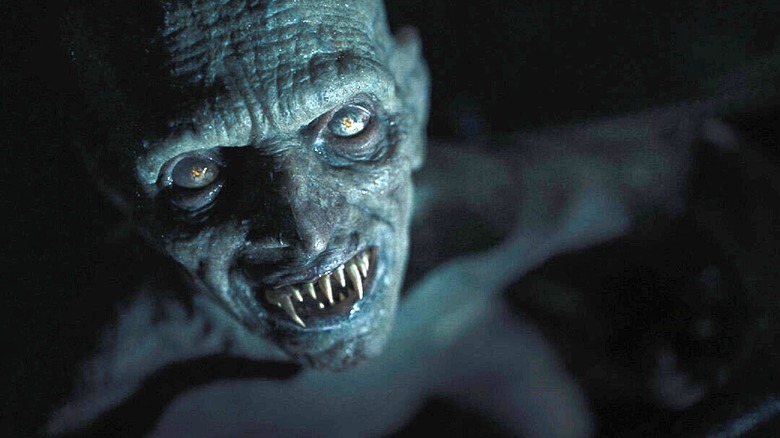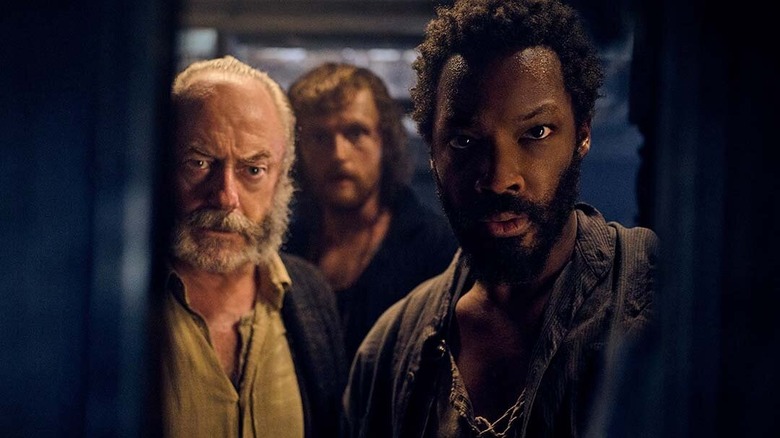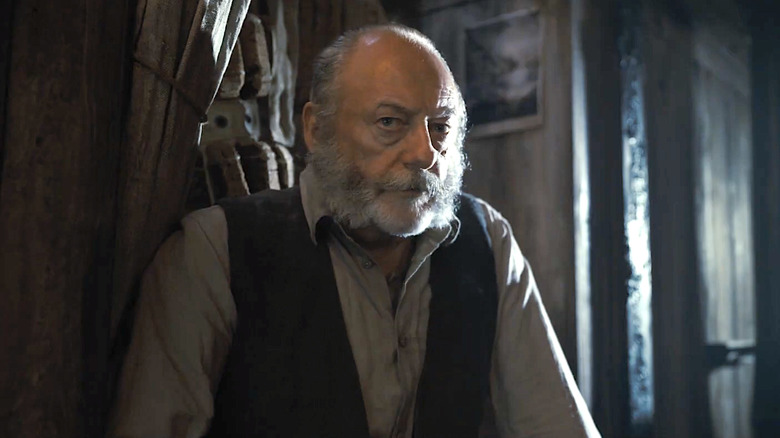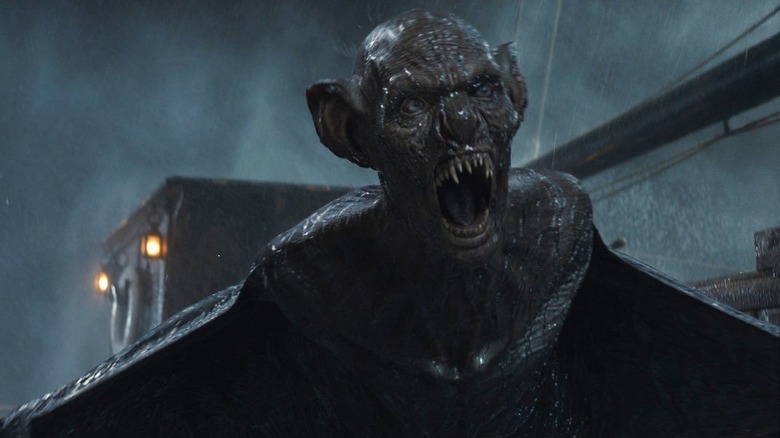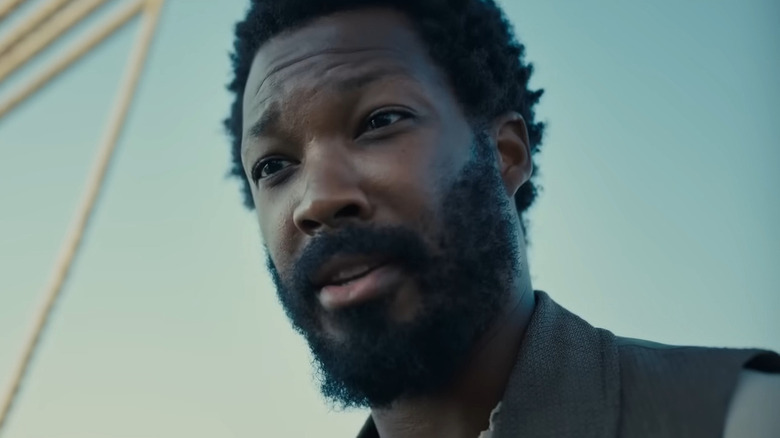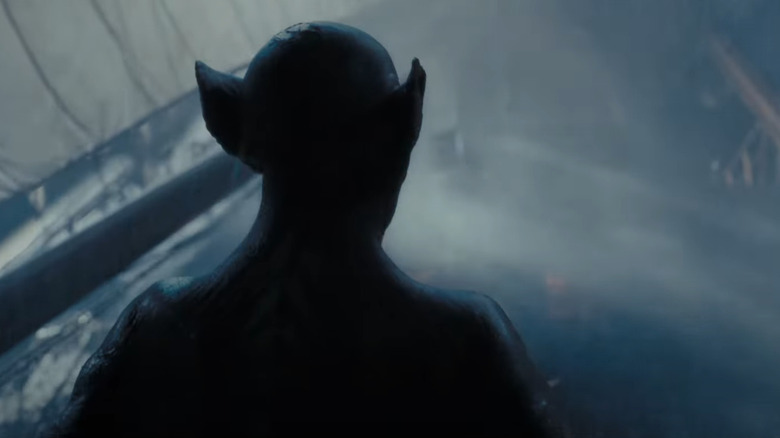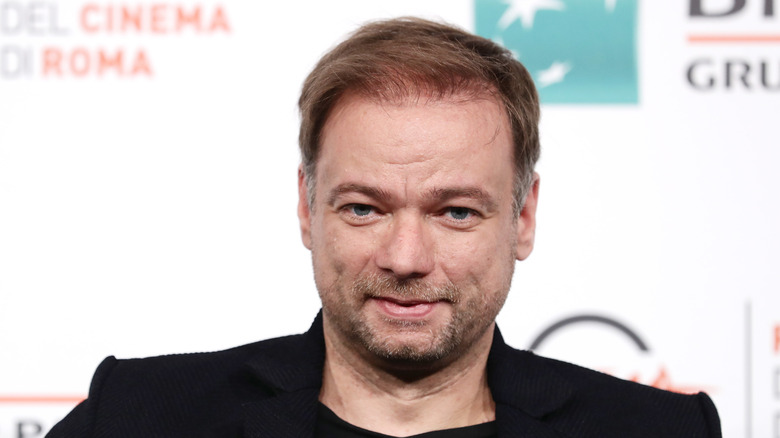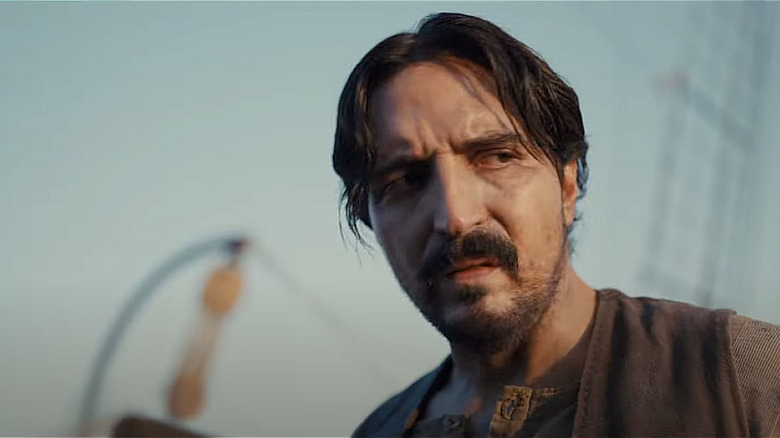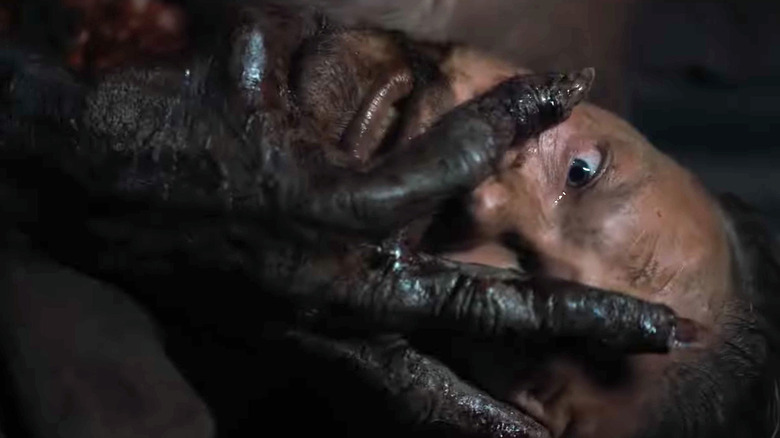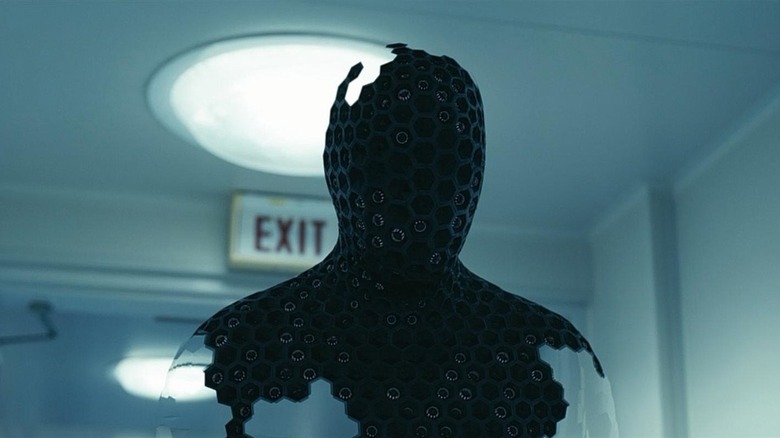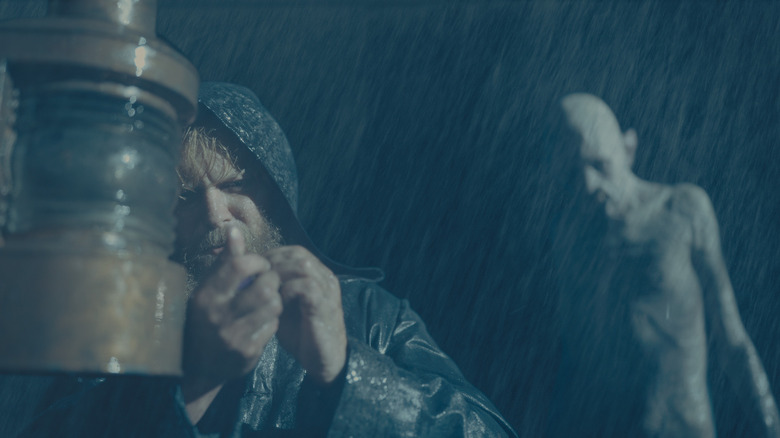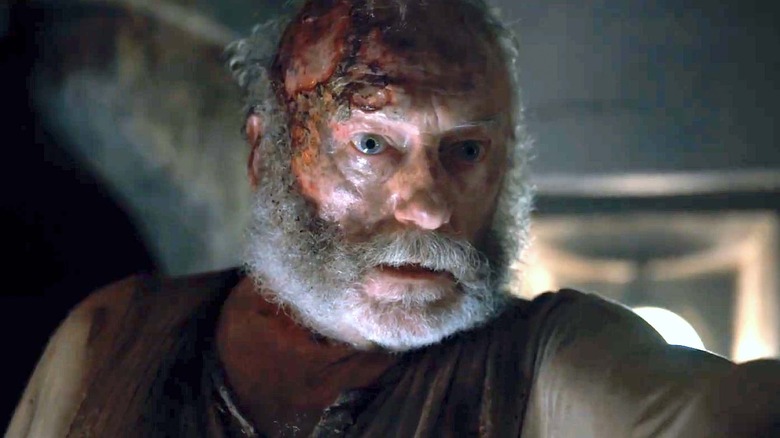The Ending Of The Last Voyage Of The Demeter Explained
André Øvredal — the director of "Scary Stories to Tell in the Dark" and "Trollhunter" — returns with a new vision for Dracula in "The Last Voyage of the Demeter." Based on the chapter titled "The Captain's Log" in Bram Stoker's "Dracula," the film follows the crew of the Demeter ship as they transport cargo to England in 1897. While the early parts of their voyage are smooth sailing, the crew begins to realize that with each passing night, their numbers grow smaller. It turns out that a bloodthirsty creature has been brought aboard and is hunting them down, so the crew must band together and come up with a plan to kill the beast before they reach the mainland.
After some more comical and charming recent depictions of Dracula, "The Last Voyage of the Demeter" reminds viewers why he's one of the scariest movie monsters. Øvredal brings a chilling Dracula to the big screen in what becomes a harrowing story of survival. Every time night falls, audiences are left in fear of what horrors will come and wondering who will bite the dust the next. Throughout all the scares and sudden turns, there are also some strong and surprisingly emotional story threads with these characters that lead to a gripping and jaw-dropping finale. Let's delve into the ending of "The Last Voyage of the Demeter."
What you need to remember about the plot
Before unpacking the film's tense finale, there are some important elements that influence the fates of the characters and their final bout with Dracula (Javier Botet). When the monster emerges each night, he targets one crew member, draining their blood so that he can regain his power and strength. As he picks off the crew one by one, Dracula goes from being a frail corpse crawling out of the shadows to a fearsome beast with devastating power. Not only can Dracula turn the crew members into his mindless minions just by biting them, but once he has consumed enough blood, he can grow wings and can fly.
By the time the crew comes to terms with the reality that they're being hunted by a monster, there's only a handful of them left and they've been mentally and physically worn down. They've witnessed most of their companions be slaughtered or turned against them by Dracula, and Captain Elliot (Liam Cunningham) has even lost his grandson Toby (Woody Norman) to the beast. However, crew member Clemens (Corey Hawkins) is able to rally those who remain to form a new plan that'll kill Dracula and keep him from reaching the mainland. But their plan to leave Dracula stuck on the sinking Demeter doesn't go as planned and leads to unimaginable bloodshed.
What happened at the end of the movie
Although Clemens' plan to use Anna (Aisling Franciosi) — a woman who was stored with Dracula as his personal feeding source — as bait to lure the creature out makes sense when he explains it, Dracula also quickly catches on to what they're up to. Dracula not only kills most of the remaining crew — leaving only Clemens and Anna alive – but he causes so much chaos and destruction on the ship that it is now barreling towards the mainland. Eventually, Dracula has Clemens in his claws and is on the verge of killing him until Anna steps in and frees him. This also causes one of the masts to fall apart and pin Dracula into the middle of the ship. Unfortunately, the monster is able to break free before the ship crashes into the mainland and flies away while Clemens and Anna float on debris just off-shore.
While Clemens is hopeful that the two of them can make it to safety, Anna's eyes turning pale signifies that she's succumbed to Dracula's bite and will burst into flames when the sun rises. Even though Clemens performed a blood transfusion on her, it only delayed the inevitable. Clemens is crushed by this realization, but Anna has accepted her fate and thanks Clemens for helping her fight back against Dracula. Without fear, she sits atop some debris and floats away from Clemens, burning to death slowly when the sun hits her skin.
What happens between Clemens and Dracula
Although the newspaper headlines seen in the final moments state that there were no survivors aboard the Demeter, we come to learn that there are actually two: Clemens and Dracula. Clemens has made it to shore and is now the only surviving crew member of the ship. While in England, Clemens searches for Dracula — who he believes is still out there somewhere — and he is given some direction on where the creature could be. Clemens has now made it his life's goal to hunt and kill Dracula so that the world can be rid of this monster. But he is unaware that he's closer than he thinks to his vampiric enemy.
Clemens hears the knocking code used on the ship and feels that it's coming from Dracula himself as a form of taunting. Suddenly, Dracula is shown hiding his horrid face under some clothes and holding the cane that Clemens found in his coffin on the ship. Dracula passes by Clemens causing him to leave his chair and follow him onto the streets. Now, neither Dracula nor Clemens is afraid to make their presence known to each other and their newfound rivalry begins.
What does the end of the movie mean
When the crew talks about what they plan to spend the money earned from the trip on, Clemens delivers a vastly different answer. Instead of wanting to spend it on a new place to live or pleasurable spoils, he says he doesn't care for the money much and hopes to gain a better understanding of the world from his travels. Although he's scoffed at by most of the crew, there's a deeper, more personal reason behind this that plays into Clemens' pursuit of Dracula at the end. When further explaining his experience in life as a Black man, Clemens talks about how he's been looked over simply because of the color of his skin. Despite his getting a great education and being a highly-skilled doctor, he was often turned away or outright rejected for being Black, causing him to become disillusioned by people and the world.
This explains why Clemens is so obsessed with exploring and trying to gain a better understanding of the world. This mindset also influences his intrigue with Dracula — a being that goes against his more logical thinking and scientific views. Now that Clemens knows that this monstrous entity exists in the world, he wishes to understand its motives and origins so that he can defeat it — which possibly influences his desires to be accepted and acknowledged for his actions rather than rejected for who he is.
Another explanation
The ending of "The Last Voyage of Demeter" also establishes a pretty grim reality for the world, and Dracula's appearance is a bad omen for humanity. Not only is Dracula free and living amongst the humans, but so far no one knows how to kill him. Even though Clemens survived his fight against Dracula on the Demeter, he isn't aware of how to defeat the vampire since Anna didn't have the answer and none of the weapons they used did anything. Further, if something as monstrous as Dracula exists, who knows what other horrors and evil creatures could exist in this world too? Evil is walking around freely and this could have damning consequences.
However, there are people like Clemens who are willing to put everything on the line to stop evil entities like Dracula. Clemens is portrayed as the Van Helsing surrogate in this story, and he pledges his life to find and kill Dracula no matter what it takes. Even when Clemens is near death fighting Dracula, he shows that he isn't afraid of him, and his further pursuit of him is meant to act as a reminder of how evil can and should be fought against. While there are powerful entities out there that represent the same kind of evil that Dracula does, there's always a way to fight back, and this is something we see at the end of the film.
What has André Øvredal said about the film and future sequels
André Øvredal is one of the most notable rising forces in the horror genre over the last few years with films like "Trollhunter," "Scary Stories to Tell in the Dark," and "The Autopsy of Jane Doe." Now with "The Last Voyage of the Demeter," he's delivered his own horrifying take on Dracula that shows a lot of potential to be something more. Speaking to Bloody Disgusting, Øvredal praised Javier Botet's performance as Dracula and said he was "curious to see how the audiences are feeling about the portrayal of Dracula, which I'm very proud of."
While Øvredal is happy with how the film has come together, the question remains whether he would have the time to continue working in this world if the opportunity comes to a sequel. It was announced that he's no longer set to direct the upcoming adaptation of Stephen King's "The Long Walk" and the only project he's currently listed to direct is a sequel to "Scary Stories to Tell in the Dark." A lot hinges on the success of "The Last Voyage of the Demeter" but Øvredal clearly isn't opposed to the idea of a sequel, so we'll just have to watch this space to see if further vampire projects come about.
What the end could mean for the franchise
Perhaps the biggest question posed by the end of the film is whether we could see more of this world. Given how this film concludes, there's certainly room for a sequel or even a prequel to be made. With Clemens now on a life-long mission to kill Dracula, a sequel could see these two at each other's throats again. Clemens could be seen trying to help another community that's being terrorized by Dracula or searching for answers on how to kill this demonic entity. We could also possibly get a prequel that fleshes out Dracula's backstory and mythos more and could even be led by Anna since her village was controlled by Dracula for a long time. Given that the film is set in the world of Bram Stoker's "Dracula," other installments could be created to adapt other parts of the novel and further flesh out this world.
What could keep the film's franchise potential from happening
While the film has clear goals for its future, there are things that could keep it from reaching them. The first obstacle the film needs to overcome is its opening weekend at the box office. It releases at a time when both "Barbie" and "Oppenheimer" still have a hold over the box office, and there's plenty of competition from the summer blockbusters. The current projections for "The Last Voyage of the Demeter" range from about $6 to $11 million — which wouldn't put it in striking distance of either film based on what they're projected to earn. The film will desperately need some good word of mouth and strong legs to have a good box office run.
The next factor in "The Last Voyage of the Demeter" being a success is if moviegoers like it. Critics, so far, haven't been too fond of the film, but the audience is often the driving force behind a film's success. The last hurdle for "The Last Voyage of the Demeter" is the competition from other vampire films — including another from Universal themselves. "Eternals" director Chloé Zhao has a "Dracula" film on the way for Universal and Pablo Larraín's vampire film "El Conde" is coming to Netflix in September. So, there's a lot of competition that could steal the film's thunder and keep it from its future ambitions.
What does the ending mean for Universal's desires to reboot their classic monsters
It's no secret that Universal has been doing everything it can to bring its classic monsters back into the limelight for years. After the Dark Universe joined the other failed cinematic universes, Universal faced an uphill struggle. However, through films like "The Invisible Man" and "Renfield," they've seen that there are ways to bring their monsters back without the need for a connected cinematic universe. "The Last Voyage of the Demeter" isn't outwardly expressed as Universal's attempt to bring one of their classic monsters back to life, but it could easily be seen as a way for Dracula's cinematic legacy to continue.
Since "Renfield" fell flat at the box office, the door is wide open for another "Dracula" story to become Universal's next big horror franchise focused on the character. With the closing moments of "The Last Voyage of the Demeter" seeing Clemens begin his pursuit of Dracula, the story could easily continue, either in a sequel or possible future crossovers should Universal reignite their monster universe.
Why the ending gives viewers a different kind of Dracula
While recent depictions of Dracula have highlighted some of his more charming characteristics, or put a comedic spin on his presence, "The Last Voyage of the Demeter" takes the character back to his horror roots. Instead of being seen as this unsuspecting charmer with a hypnotizing power, Dracula is shown here to be more of an escaped demon from hell. His teeth are disfigured and sharpened to quickly draw blood from his victims and he has a pale, emaciated look that will instantly give you chills. By the time Dracula reaches his final form at the end of the film — with his wings and bat-like ears — he looks even more demonic.
However, what's most interesting about this portrayal of Dracula is that he doesn't change his look when trying to hide among humans. When he is shown in the final moments of the film, he's just wearing clothes that slightly obscure his face to help him blend in. This is interesting since it was established earlier that he controlled Anna's village for years despite clearly standing out. This suggests that instead of using charm and suave looks to control those around him, this Dracula relies more on fear, intimidation, and force to control others — something that is incredibly different from other Draculas we've seen before.
What new mythos comes from the ending
Along with a new physical depiction of Dracula, the ending of "The Last Voyage of the Demeter" also establishes some interesting new mythos surrounding the character and his new pursuer, Clemens. With this Dracula using fear and intimidation to maintain his power, we get a more beastly monster who views his victims as disposable sources of food rather than people. He's much more dangerous to people than ever before and the minions he creates with the virus from his bite are much more violent and destructive than ever before. When Olgaren (Stefan Kapičić) gets possessed, he's shown to be very zombie-like and will go to any length — including self-harm — to do Dracula's bidding. Let's not forget the fact that anyone with Dracula's blood in them will be consumed by flames by the time morning comes around — further evidence that becoming Dracula's minion is deadlier than ever before.
In Clemens, we get a new type of Van Helsing — one who will go to the ends of the earth to kill Dracula. Rather than have a background as a hunter or someone who's been tormented by Dracula for many years, his feud with Dracula is fresh and his background as a doctor gives him new ways of fighting the monster's control. These elements give the film a sense of familiarity but a newness as well, and the ending puts its own spin on the classic mythos in a way that feels exciting and interesting.
